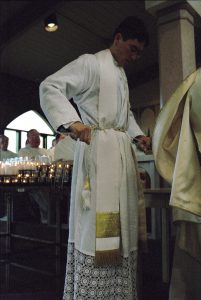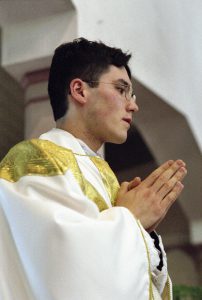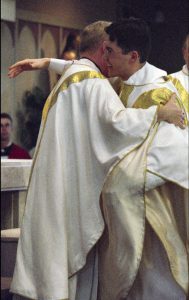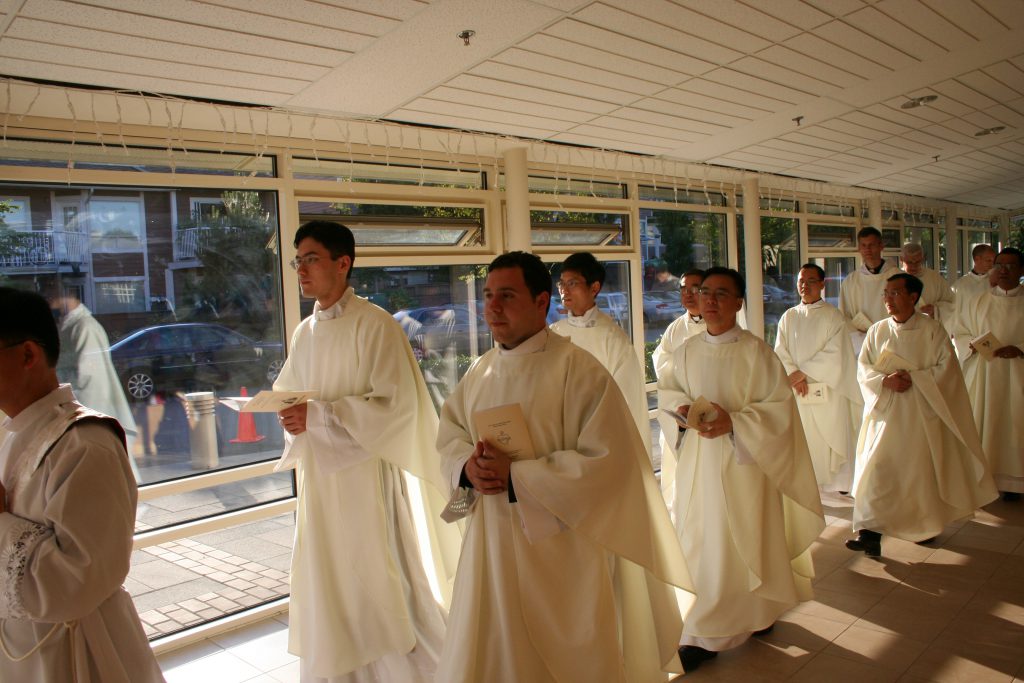Given that today the Gospel is about the selection of the 12 apostles, and that today is my 17th anniversary of priesthood, we praise Jesus Christ, our high priest, for the gift of the priesthood. While my priesthood is a blessing to me, it’s meant for all of us.
The first words of the Gospel reveal Jesus’ priestly heart, and He wants us to have the same heart: “When he saw the crowds, he had compassion for them, because they were harassed and helpless, like sheep without a shepherd” (Mt 9:36). We’ve talked about the word ‘compassion’ before: It’s the same word to describe the Father of the Prodigal Son when he sees his son return home, and when the Good Samaritan sees the man half dead on the roadside. It comes from the Hebrew word relating to a mother’s womb, meaning we feel care for someone in the depths of our being.
Do we ever feel a similar compassion? What breaks our heart? When we see people starving or homeless? Sick or mentally ill? When we think about the unborn or those who are persecuted?
When I was 14 and took a career survey at school, it said that I was interested in helping people, so, I thought simply, “Priests spend their whole lives helping people. Maybe I should be a priest. If I’m going to do it, I should do it in the best possible way.”
‘Like sheep without a shepherd’ refers to a chapter in Ezekiel when God criticizes the leaders of Israel who take care of themselves and neglect the people. And God promises that He will be the new leader of people. Therefore, this phrase is telling us that God is finally leading His people through Jesus.
And so, Jesus does something! He calls other people, the 12 apostles, to shepherd with Him. This is the mystery of what we call secondary causes. A primary cause is when God works directly, as when, if we’re sick, God heals us miraculously. However, He respects the order of what He created and normally expects us to use secondary means. When we’re sick, He expects us to go to a doctor; when we want to learn, we go to teachers; and when we need spiritual leadership, we go to other disciples, and, in a special way, priests.
There are three possible reasons why:
1) Humans are interdependent. Biologically, God fathers us through parents. Spiritually, He fathers us through priests. We depend on others for natural and supernatural gifts.
2) Jesus wants us to have a spiritual father who’s close to us, because we’re bodily beings, and need spiritual fathers with whom we can have contact. It doesn’t mean the priest talks individually to every person, but all Catholics do have some physical connection to a priest.
3) God wants us to share in generating spiritual life. Scott Hahn once shared a story about a man who was mowing his lawn and whose son got in the way. At first, the father wanted his son just to sit down and let him cut the grass, but later, he put his son in front of him, put his hands to the lawnmower, and lead his son in cutting the grass. The father didn’t just do everything for his son, but allowed his son to share in the work. God wants all of us to share in teaching others, because teaching makes us more like Him.
Jesus had many women followers, who were the most faithful, and His own mother was the only perfect disciple. Nevertheless, in this Gospel, He only chooses men, because, as we’ve said before, priesthood is about spiritual fatherhood. In terms of procreation, life passes through men to women, and life resides within women; women bear life inside of them whereas life passes through men to other people. That is why the Church is called mother, because spiritual life is created within her. And with priests, God’s love goes through priests to reach people in the Eucharist; His mercy passes through us to reach people in the Sacrament of Confession.
All women discover at puberty that their body and their whole being are geared towards motherhood, whether physical or spiritual. In a certain sense, their vocation is thrust upon them. Yet, for men, we must choose to become fathers. At a certain point in life, we accept our vocation to be physical or spiritual fathers and let life pass through us. When we don’t, we remain irresponsible and just boys; boys are males who do not give life. That’s why a boy who takes care of his parents, or mentors younger boys, or who serves others starts to become a man!
After my conversion at 16, when I made Jesus the center of my life, I felt a calling: I wondered if God wanted me to give spiritual life to others, because I knew this was the greatest gift people could receive. There is nothing better than for people to encounter Christ and His mercy and love, and then see the meaning of our lives and reality.
We know from the structure of today’s Gospel that the focus is on Jesus giving the apostles authority to cast out evil spirits and to cure people. This is the blessing of the priesthood: Our authority allows us to nourish people in remarkable ways. But it’s also a risk: With authority, we can also hurt people. Like any parent, we realize that we’re not worthy of this vocation. Nevertheless, the call remains: God the Father invites men to be spiritual fathers, to give people the Eucharist, to forgive their sins, to teach and to shepherd the sheep.
The priesthood is a profound mystery, because it comes from the heart of God. Today, let’s first thank God for all the priests who have loved us in our lives, and let’s celebrate the seminarians who were with us and who have become priests: Fr. Lucio Choi, Fr. Juan Lucca, Fr. Felix Min, Fr. Raffaele Salvino, and Deacon Medard Kamanzi who’ll be ordained priest on July 1, 2023. Second, let’s pray that God give the Church more holy priests, men who accept the call to be spiritual fathers.
Now, let’s conclude by pondering St. John Paul II’s call to priesthood. In 1996, he wrote a short book entitled Gift and Mystery, on the occasion of his 50 years as a priest, and three times he says that a certain experience “left a profound impression on me” and guided him to become a priest.
The first was when he was 20 years old working in a stone quarry. During the detonation of a dynamite charge, some rocks struck a worker and killed him. He says that “the experience left a profound impression on me,” specifying nothing more than that they carried away the man’s body in silence and that his death was wrong (9-10). All I can conclude is that his heart must have been moved like Christ’s for these workers. He had a big heart for people.
Second, John Paul was in love with theater, art, and literature. When the Nazis invaded Poland, he was part of an underground theater group that tried to keep Polish culture alive. Though this experience left a deep impression on him, he says he knew it wasn’t his real vocation (11). Every man who is called by God to the priesthood is asked to sacrifice something which is truly good and which he truly loves. The question I had to wrestle with was: ‘What does God want,’ instead of, ‘What do I want?’ What would do the greatest good for people, not for me? The sacrifice of what we love is part of giving life to others.
The final experience that left a profound impression on John Paul was in the last years of high school, when his confessor invited him to take part in the liturgies of the Triduum—that’s all he says. What happened to him is probably what happens to all men called to the priesthood. At a certain age, we come to love the Eucharist and the sacrifice of the Mass, and realize that we’re participating in something mysterious and sacred, that something beyond our world is coming to us, and that this is something to which it’s worth dedicating our lives.





